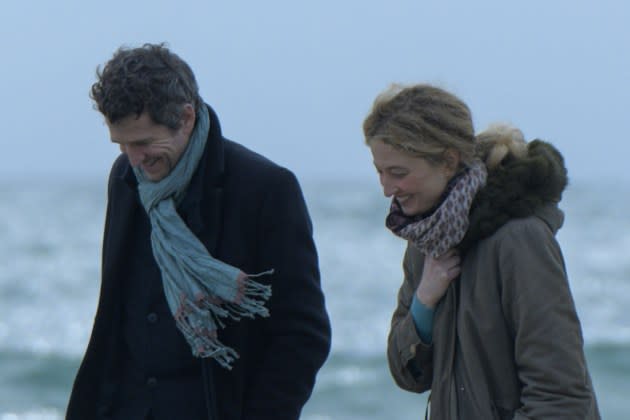‘Out of Season’ Review: An Ideally Paired Alba Rohrwacher and Guillaume Canet Consider Roads Not Taken in Stéphane Brizé’s Rueful Romance

The rich vein of melancholy regret running through Out of Season (Hors-Saison) at times risks tipping over into kitschy nostalgia, with its Lelouch-like intimacy playing out on a wintry seashore to the strains of a wispy, sentimental score. But the throwback feel is deftly offset in Stéphane Brizé’s latest by the emotional vitality of the writing, the interplay of comedy with lingering romantic sorrow and the exquisite chemistry between Alba Rohrwacher and Guillaume Canet, playing former lovers who find a bittersweet reprieve from the disillusioned stasis of their lives when their paths cross years after they were involved.
Brizé’s 10th feature marks a shift from his recent trilogy of sociopolitical workplace dramas starring Vincent Lindon — The Measure of a Man, At War, Another World — fueled by indignation over labor issues. It’s closer in tone to the delicate romances he made more than 10 years ago, notably Mademoiselle Chambon.
More from The Hollywood Reporter
Canet plays Mathieu, a popular French film actor who has gotten cold feet over a much-publicized theatrical production that would have marked his Paris stage debut and backed out of it a month before performances were due to start. Looking to offload stress and escape some of the fallout, he checks in for a weeklong wellness package at a luxury spa on the Brittany coast.
There are distinct echoes in Mathieu of Bill Murray’s movie-star-in-limbo character from Lost in Translation, with the massive spa hotel, its sterile white environments and sleek modern furnishings functioning in similarly alienating ways to the high-end Tokyo hotel in Sofia Coppola’s movie.
Canet nudges the establishing scenes almost into deadpan farce as Mathieu sits around looking glum in his plush bathrobe, endures the endless requests of staff and guests for selfies, tangles with compression massage equipment or a smart coffeemaker that’s not at all user-friendly, or just stares blankly as he opens and closes the remotely operated doors in his suite.
The urging of a logorrheic fitness trainer (Hugo Dillon) during a beach session to find “solidarity between the inner and the outer” has about as much effect as the seaweed wraps. Likewise phone calls to his wife back in Paris (voiced by co-writer Marie Drucker), a busy primetime news anchor who dismisses his career concerns with brisk but unhelpful solutions.
Mathieu is somewhat roused from his funk when he’s contacted out of the blue by Alice (Rohrwacher), an Italian long settled in France, who lives in the seaside town with her husband (Sharif Andoura) and teenage daughter (Emmy Boissard Paumelle). They meet for coffee and a warm exchange of small talk, only gradually getting around to the relationship that ended 15 years earlier when Mathieu chose to pursue a different life.
Brizé and Drucker’s script shows a pleasingly light touch as it teases out the dissatisfaction in both their lives, and the contemplation — clearly not for the first time in Alice’s case — of what might have been had they remained together. The latter strain, with its unexpressed wistfulness, gives the film thematic elements in common with Celine Song’s Past Lives.
Those themes also ripple through a lovely video interlude, shot by Alice at the elder-care facility where she works, in which a 78-year-old woman (Lucette Beudin) speaks with disarming candor about marriage, having three children by the time she was 22, and regarding sex with her husband as a conjugal duty. Only when he died was she able to explore her sexuality and find true happiness with the love of her life (Gilberte Bellus). The empathy implicit in Alice’s questions is as moving as the experiences of the woman being interviewed.
Alice invites Mathieu as her guest to the two women’s wedding reception, and while the bird imitators providing the entertainment are a tad precious, the relaxed atmosphere of joyous conviviality seems a tonic for a man so inured to keeping up the appearances required of a life in the public eye.
Brizé expertly gauges subtle shifts throughout the film, tapping the power of nature in the windswept beach, the choppy sea, the drab gray skies or the rocky shoreline as dormant feelings between the former lovers resurface like sad, sensual ghosts of their former selves.
Shots of Alice at home with her family suggest the degree to which she’s alone, while the piano composition she plays for Mathieu on a recording reveals how much her creative fulfilment has been compartmentalized, even stifled. “I’ve dug myself into a hole,” says Alice, as the film completes a graceful swerve from Mathieu’s mopey ennui and self-doubt to her profound emotional isolation.
While the vivid sense of place is that of a sleepy winter in a summer town, there’s a suggestion that for Alice, inertia is not seasonal.
Both lead performances in this minor-key chamber piece are deeply felt, steeped in tenderness. Canet is unexpectedly affecting as Mathieu’s debonair charm, for so long his stock-in-trade, suddenly seems inadequate in the face of Alice’s honesty, just as his career insecurities feel trivial. Rohrwacher’s beautiful work haunts you even after the end credits roll. Alice cycles through the warm pleasures of renewed fondness to reproach, anger and resentment as old wounds are reopened and long-buried disappointments bring fresh pain.
The unerring restraint of both actors, even as they navigate a thicket of spiky emotions, gives Out of Season satisfying depths that go far beyond the elegant film’s seeming simplicity.
Best of The Hollywood Reporter

 Yahoo News
Yahoo News 